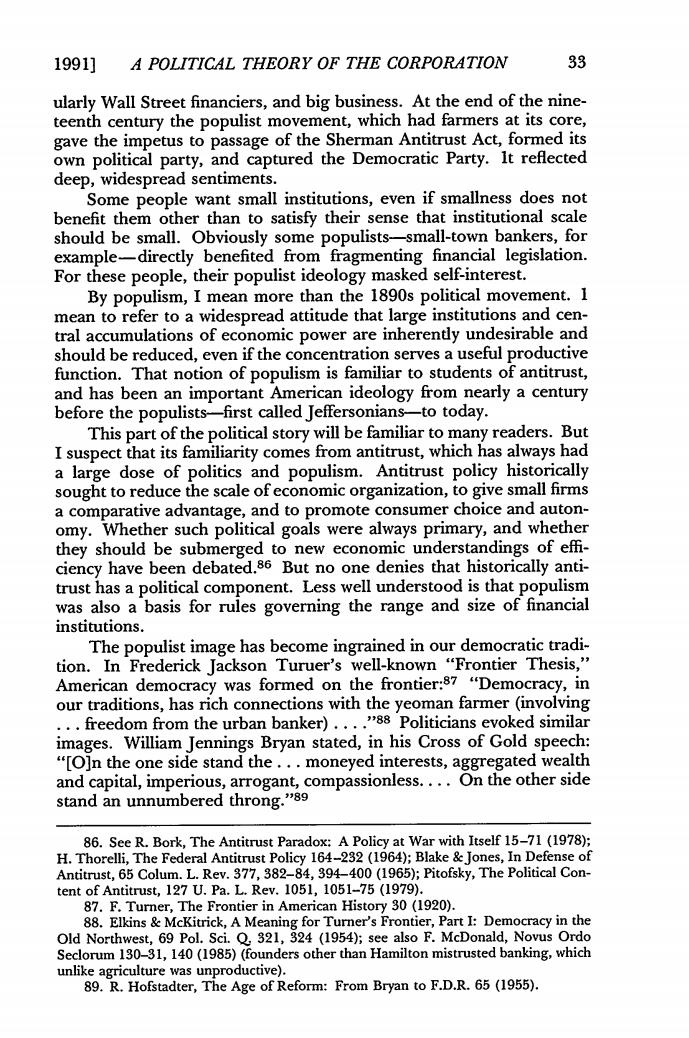正在加载图片...

1991] A POLITICAL THEORY OF THE CORPORATION 33 ularly Wall Street financiers,and big business.At the end of the nine- teenth century the populist mo nt,which had farm s at its co gave the impetus to passage of the Sherman Antitrust Act,formed its own political party,and captured the Democratic Party.It reflected deep,widespread sentiments. e people want small institutions,even if smallness does not benefit them ot than c o satisfy their sense that institutio nal scale should be small.Obviously some populists- -small-town ankers,for example-directly benefited from fragmenting financial legislation. For these people,their populist ideology masked self-interest. By populism,I mean more than the 1890s political movement.1 mean to refer to a widespread attitude that large institut tral accumulations of conomic power are inherently unde e and should be reduced,even if the concentration serves a useful productive function.That notion of populism is familiar to students of antitrust, s beer an ortant American ideology from nearly a century first called Jeffer -to today This part of the political story will be familiar to many readers.But I suspect that its familiarity comes from antitrust,which has always had a large dose of politics and populism.Antitrust policy historically sought to reduce the scaef mic organization,to give small firms a comparative advantage,and to promot consum ch omy. Whether such political goals were always primary,a they should be submerged to new economic understandings of effi ciency have been debated.86 But no one denies that historically anti- trust has a political component.Less well understood is that populism wa also abasis for rules governing the range and size of financial institutions. The populist image has become ingrained in our democratic tradi tion.In Frederick Jackson Turuer's well-known "Frontier Thesis," American democracy was formed on the frontier:87 "Democracy,in our tradit ions ,has ch ns nith the a ye man farmer (involving om from the urban banker). oliticians oked simila images.William Jennings Bryan stated,in his Cross of Gold speec "[O]n the one side stand the.moneyed interests,aggregated wealth and capital,imperious,compassionless. On the other side stand an unnu red th 989 86.See R.Bork,The Antitrust Paradox:A Policy at War with Itself 15-71(1978) H.Thoreli The Federa Ans 6 2 Antitrust,65 Co 265):Pito sky,T es,In C ten 1051-75(1979 87.F.Tu rican Histor y30(1920). 88.Elkins&Mckitrick,A Meaning for Tumner's Frontier,Part I:Democracy in the Old Northwest,69 Pol.Sci.Q 321,324 (1954);see also F.McDona d, Seclorum130-31,140(1985) lers other than Ham 1991] A POLITICAL THEORY OF THE CORPORATION 33 ularly Wall Street financiers, and big business. At the end of the nineteenth century the populist movement, which had farmers at its core, gave the impetus to passage of the Sherman Antitrust Act, formed its own political party, and captured the Democratic Party. It reflected deep, widespread sentiments. Some people want small institutions, even if smallness does not benefit them other than to satisfy their sense that institutional scale should be small. Obviously some populists-small-town bankers, for example-directly benefited from fragmenting financial legislation. For these people, their populist ideology masked self-interest. By populism, I mean more than the 1890s political movement. I mean to refer to a widespread attitude that large institutions and central accumulations of economic power are inherently undesirable and should be reduced, even if the concentration serves a useful productive function. That notion of populism is familiar to students of antitrust, and has been an important American ideology from nearly a century before the populists-first called Jeffersonians-to today. This part of the political story will be familiar to many readers. But I suspect that its familiarity comes from antitrust, which has always had a large dose of politics and populism. Antitrust policy historically sought to reduce the scale of economic organization, to give small firms a comparative advantage, and to promote consumer choice and autonomy. Whether such political goals were always primary, and whether they should be submerged to new economic understandings of efficiency have been debated. 86 But no one denies that historically antitrust has a political component. Less well understood is that populism was also a basis for rules governing the range and size of financial institutions. The populist image has become ingrained in our democratic tradition. In Frederick Jackson Turner's well-known "Frontier Thesis," American democracy was formed on the frontier:87 "Democracy, in our traditions, has rich connections with the yeoman farmer (involving . freedom from the urban banker) . 88 Politicians evoked similar images. William Jennings Bryan stated, in his Cross of Gold speech: "[O]n the one side stand the. moneyed interests, aggregated wealth and capital, imperious, arrogant, compassionless. On the other side stand an unnumbered throng." 89 86. See R. Bork, The Antitrust Paradox: A Policy at War with Itself 15-71 (1978); H. Thorelli, The Federal Antitrust Policy 164-232 (1964); Blake &Jones, In Defense of Antitrust, 65 Colum. L. Rev. 377, 382-84, 394-400 (1965); Pitofsky, The Political Content of Antitrust, 127 U. Pa. L. Rev. 1051, 1051-75 (1979). 87. F. Turner, The Frontier in American History 30 (1920). 88. Elkins & McKitrick, A Meaning for Turner's Frontier, Part I: Democracy in the Old Northwest, 69 Pol. Sci. Q. 321, 324 (1954); see also F. McDonald, Novus Ordo Seclorum 130-31, 140 (1985) (founders other than Hamilton mistrusted banking, which unlike agriculture was unproductive). 89. R. Hofstadter, The Age of Reform: From Bryan to F.D.R. 65 (1955)